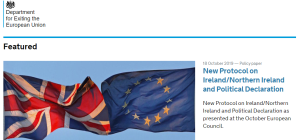 Acceding to the Hague Choice of Court Convention is one of the unilateral steps the United Kingdom is planning to take to partially close the gap that will open in the field of judicial cooperation when the Brussels Regulation falls away upon Brexit.
Acceding to the Hague Choice of Court Convention is one of the unilateral steps the United Kingdom is planning to take to partially close the gap that will open in the field of judicial cooperation when the Brussels Regulation falls away upon Brexit.
Category: Brussels I Regulation
Today is Brexit Day – What’s New?
 Today is Brexit Day. The United Kingdom is leaving the European Union. It might be worth looking at what changes as of midnight today. Spoiler alert: Practically speaking, not much. Article 126 of the Agreement on the Withdrawal of the United Kingdom of Great Britain and Northern Ireland from the European Union and the European Atomic Energy Community (Withdrawal Agreement; WA) is short and straightforward: “There shall be a transition or implementation period, which shall start on the date of entry into force of this Agreement and end on 31 December 2020.”
Today is Brexit Day. The United Kingdom is leaving the European Union. It might be worth looking at what changes as of midnight today. Spoiler alert: Practically speaking, not much. Article 126 of the Agreement on the Withdrawal of the United Kingdom of Great Britain and Northern Ireland from the European Union and the European Atomic Energy Community (Withdrawal Agreement; WA) is short and straightforward: “There shall be a transition or implementation period, which shall start on the date of entry into force of this Agreement and end on 31 December 2020.”
Case of the Week: Litigating in the Shadow of Brexit
 This week, yet another Brexit deadline expired without additional clarity as to when and on what terms Brexit will occur. This creates uncertainties, which affect business relations with British parties, and impact, amongst many other fields, civil litigation. So in this week’s Case of the Week, we present the three cases I know of in which German courts had to decide on Brexit-related issues. The cases deal with security for costs, the validity of choice of court agreements and with freezing orders in a Brexit context. Read More
This week, yet another Brexit deadline expired without additional clarity as to when and on what terms Brexit will occur. This creates uncertainties, which affect business relations with British parties, and impact, amongst many other fields, civil litigation. So in this week’s Case of the Week, we present the three cases I know of in which German courts had to decide on Brexit-related issues. The cases deal with security for costs, the validity of choice of court agreements and with freezing orders in a Brexit context. Read More
Case of the Week: Brexit Does Not Facilitate Freezing Orders
 In my opinion, obtaining a freezing order (Arrest) against the debtor pending final judgment tends to be rather difficult in this jurisdiction. Often, the courts set the bar for showing that “the enforcement of the judgment would be frustrated or be significantly more difficult”, as Section 917 German Code of Civil Procedure (ZPO) puts it, frustratingly high. It is somewhat easier if the debtor is situated abroad: Section 917 para. 2 ZPO stipulates that it is sufficient grounds for a freezing order if the judgment would have to be enforced abroad and there is no reciprocity with the foreign jurisdiction (Arrestgrund der Auslandsvollstreckung). As there is reciprocity across all member states of the European Union, this does not work, however, with respect to a debtor situated in the United Kingdom – at least for now.
In my opinion, obtaining a freezing order (Arrest) against the debtor pending final judgment tends to be rather difficult in this jurisdiction. Often, the courts set the bar for showing that “the enforcement of the judgment would be frustrated or be significantly more difficult”, as Section 917 German Code of Civil Procedure (ZPO) puts it, frustratingly high. It is somewhat easier if the debtor is situated abroad: Section 917 para. 2 ZPO stipulates that it is sufficient grounds for a freezing order if the judgment would have to be enforced abroad and there is no reciprocity with the foreign jurisdiction (Arrestgrund der Auslandsvollstreckung). As there is reciprocity across all member states of the European Union, this does not work, however, with respect to a debtor situated in the United Kingdom – at least for now.
In a recent case in the Frankfurt Court of Appeals (Oberlandesgericht), the applicant was seeking a freezing order against a German national who had moved to the United Kingdom. The applicant argued that given the United Kingdom’s decision to leave the European Union and given that a final judgment would not be in place prior to the current Brexit deadline of 31 October 2019, the reciprocity exemption should not apply to the United Kingdom. Accordingly the freezing order should be granted pursuant to Section 917 para. 2 ZPO.
